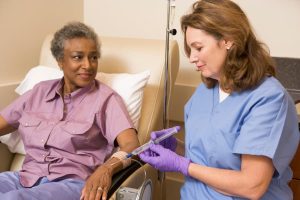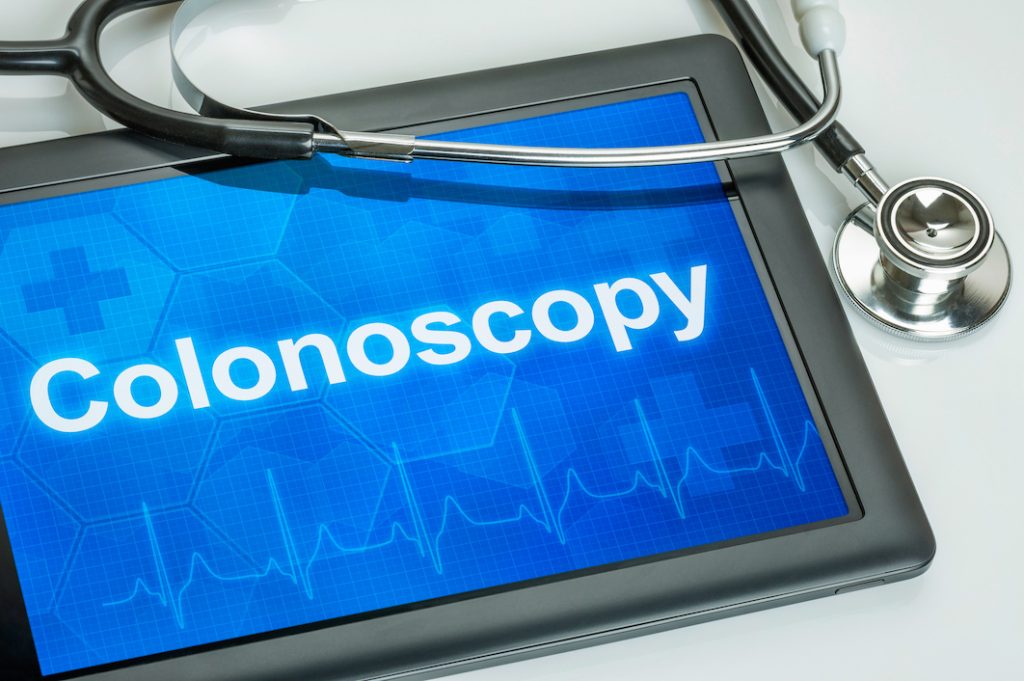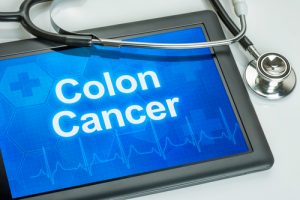
Immunotherapy for Colon Cancer Treatment
If you or a loved one has been diagnosed with colon cancer, identifying the treatment approach that’s best for you and your particular circumstances is
HIPAA Alert: Potential Data Breach Learn More
Questions on Oncology, Hematology and/or Infusion Clinical Services due to COVID-19 Crisis – CALL 833-698-1623
Important Information for Our Patients Regarding the Coronavirus.
RCCA Providing Area Cancer Patients with Access to Care During Coronavirus Outbreak
RCCA Offering Patients Virtual Visits During Coronavirus Pandemic
If you’re thinking you want to wait on that colorectal cancer screening recommended by your healthcare provider, two medical oncologists with Regional Cancer Care Associates (RCCA) say there’s good reason to think again – and to act now.
Avishek Kumar, MD, is a board-certified medical oncologist who practices in the Edison, NJ, offices of RCCA, one of the nation’s largest networks of oncology specialists. He explains that about half of American adults develop polyps, which are abnormal growths on the lining of the colon or rectum. Most polyps don’t cause symptoms, so people can have one or more polyps and not know it, he says. Dr. Kumar adds that a small percentage of these polyps become cancerous. Left undetected and untreated, the cancer can grow and spread – often while causing no symptoms or only minimal symptoms initially.
Colorectal screening allows polyps to be identified and removed before they become cancerous or, if cancer already has developed, enables treatment of the disease in its earliest stages. “If you diagnose colon cancer early, while it is still localized, it is much easier to treat the cancer effectively, sometimes solely by means of surgery. By contrast, if the cancer is not found early, it can spread throughout the body and it becomes much more difficult to treat,” Dr. Kumar says.

Indeed, nearly 91% of people treated for localized colorectal cancer are alive 5 years after diagnosis, according to the American Cancer Society. However, the 5-year survival rate drops to 14 percent when colorectal cancer has spread throughout the body.1
“Screening saves lives. That’s the main thing people need to know,” says Julianne W. Childs, DO, a board-certified medical oncologist and hematologist practicing at RCCA’s care centers in Cape May Court House and Marmora, NJ. To underscore her point, Dr. Childs notes that a large-scale study published in the New England Journal of Medicine found that removing polyps at colonoscopy reduced the colorectal cancer death rate by 53%.2 (For information on reducing your risk of developing colorectal cancer in the first place, see the accompanying article, “5 ways you can reduce your risk for colorectal .”)
When to screen – and how often?
The United States Preventive Services Task Force (USPSTF), an organization of medical experts who make research-based preventive care recommendations, long urged that adults aged 50 to 75 years have periodic colorectal cancer screenings, and that some people aged 76 to 86 be screened based on their overall health, screening history, and preferences.
In 2020, however, the USPSTF lowered its recommended age for initial screening to 45 years. The Task Force acted in response to a 15% increase in colorectal cancer cases over the past several years among patients ages 40 to 49. Two years earlier, the American Cancer Society lowered its minimum age for colorectal screening to 45 years. (For information on specific screening approaches, see the accompanying article, “Comparing colorectal cancer screening .”)
Patients at normal risk. Drs. Childs and Kumar urge most people to start screening for colorectal cancer at age 45. While colonoscopy is one of the most common screening methods, some people with no risk factors for colorectal cancer might instead use an at-home stool test, followed by a colonoscopy if the stool test results are suspicious. (See “Comparing colorectal cancer screening methods.”)
If colonoscopy test results are negative, people generally can wait 7 to 10 years for the next screening, the RCCA oncologists note. However, if one or more polyps are found and removed, a repeat colonoscopy should be performed in a shorter time frame, with the number of years between that first screening and a second colonoscopy determined by factors including the type and number of polyps found initially, the doctors say. Dr. Childs adds that if no polyps are found at the second colonoscopy, the next screening interval may be extended.
Patients at increased risk. Certain risk factors for colorectal cancer may warrant initiating screening before age 45, Dr. Kumar says. These risk factors include:
If a family member has had colorectal cancer, have your first screening 10 years before the age at which your relative was diagnosed, Dr. Childs urges. “For example, if your brother was diagnosed with colon cancer at age 45, start getting screened at age 35,” she says.
Why people don’t get screened
Although colorectal cancer screening has been shown to save lives, many people are reluctant to be screened. The USPSTF reports that nearly one in three adults who are eligible for colorectal cancer screening are not up to date with their testing intervals.
The RCCA oncologists note that people who avoid or defer colorectal screening often cite the required pre-colonoscopy fasting and bowel-cleansing regimen as reasons, while others express concern about being sedated for the procedure or the risk of having an adverse event, such as a bowel perforation – a hole in the wall of the colon – which can be caused by the small scope inserted rectally to inspect the bowel during colonoscopy. Bowel perforation, although serious and requiring emergency management, is extremely rare at colonoscopy, especially given the precision of today’s advanced equipment, the oncologists note.
And while Dr. Childs and Dr. Kumar acknowledge that taking a day off from work or other activities to prepare for and have a colonoscopy can be inconvenient, they note that it is an inconvenience that may prove life-saving.
Dr. Kumar recounts the story of one of his patients by way of example. The patient’s primary care provider recommended that he have a colonoscopy, but the man felt fine and saw no reason to disrupt his schedule to have the screening test. However, his wife urged him to reconsider, and several months later he agreed to have the procedure.
During the colonoscopy, the gastroenterologist found and removed a cancerous growth. The patient was diagnosed with Stage 2 colon cancer that had spread toward the colon wall. Fortunately, Dr. Kumar says, the cancer was still localized and was treated effectively with surgery.
“I’ve been following him for years now and he’s doing well,” Dr. Kumar says.
Dr. Childs remembers a 25-year-old man with iron deficiency anemia, which she notes is highly unusual for a young man. She referred the patient for a colonoscopy, suspecting that an intestinal disorder might be causing internal blood loss. Sure enough, a suspicious mass was found and the patient was diagnosed with Stage 2 colon cancer, Dr. Childs says. He, too, was treated successfully.
“He’s now 40 and has children,” Dr. Childs says. “If he hadn’t complained of not feeling well or had never been followed up for anemia, he never would have been diagnosed.”
To close on another potentially life-saving point: If you spot blood following a bowel movement, such as blood in the toilet bowl or in the stool, don’t assume that it’s because the skin around the anus is irritated or is due to hemorrhoids or some other less-concerning cause, Dr. Childs says. “Patients and even some physicians tend to discount this finding, but it’s more reasonable to make sure the blood is not from a polyp or other, more-significant issue,” she explains.
Dr. Childs and Dr. Kumar are among the 90+ cancer specialists who treat patients at 23 RCCA care centers located throughout New Jersey, Connecticut, Maryland, and the Washington, DC, area. RCCA oncologists and hematologists see more than 23,000 new patients each year and provide care to more than 225,000 established patients, collaborating closely with their patients’ other physicians. They offer patients the latest in cutting-edge treatments, including immunotherapies and targeted therapy, as well as access to a wide range of clinical trials. In addition to serving patients who have solid tumors, blood-based cancers, and benign blood disorders such as anemia, RCCA care centers also provide infusion services to people with a number of non-oncologic conditions—including multiple sclerosis, Crohn’s disease, asthma, iron-deficiency anemia, and rheumatoid arthritis—who take intravenously-administered medications.
To learn more about RCCA, call 844-928-0089 or visit RCCA.com.
References
For more information or to schedule an appointment,
call 844-346-7222. You can also schedule an appointment by calling the RCCA location nearest you.

If you or a loved one has been diagnosed with colon cancer, identifying the treatment approach that’s best for you and your particular circumstances is

Some symptoms of colon cancer may not be easy to diagnose. Read about the more uncommon symptoms on Regional Cancer Care Associates’ online blog.

Colon cancer continues to be one of the most common cancer types diagnosed in men and women in the United States. The American Cancer Society

Regional Cancer Care Associates is one of fewer than 200 medical practices in the country selected to participate in the Oncology Care Model (OCM); a recent Medicare initiative aimed at improving care coordination and access to and quality of care for Medicare beneficiaries undergoing chemotherapy treatment.